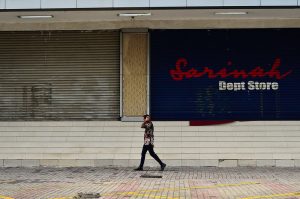China has promised to work with Indonesia to try to close the global “vaccine divide,” as the Southeast Asian nation continues to struggle with COVID-19 outbreaks and vaccine delivery delays.
On Tuesday, Indonesian President Joko Widodo spoke on the phone with his Chinese counterpart Xi Jinping, who told him that China would help Indonesia to build a regional vaccine production center while working to vaccinate its own population. China and Indonesia both “attach great importance to the life safety and health of the people, and oppose ‘vaccine nationalism’,” a Chinese Foreign Ministry statement paraphrased Xi as saying.
Indonesia has recorded the largest number of coronavirus cases in Southeast Asia. Since its peak in January and February, Indonesia’s case numbers have finally begun to flatten, but the nation is still recording around 5,000 cases per day
Yesterday, the country’s Health Ministry recorded 5,720 new cases of COVID-19, bringing its running total to 1,620,569. It also recorded 230 fatalities, bring its total death toll to 44,007. Many experts believe that these figures understate the true extent of COVID-19 in Indonesia, which in the early stages of the pandemic had one of the lowest rates of testing in the world.
Given its inability to get the virus fully under control, the Indonesian government has been proactive in seeking to procure vaccines to inoculate its 270 million people. In January, Jokowi’s government launched an ambitious plan to vaccinate around 181.5 million people against COVID-19 within a year.
To supply the necessary doses, Indonesia has turned to a wide range of suppliers. The Chinese firm Sinovac has supplied about 56 million doses so far, while Indonesia also expects to receive more than 20.2 million doses in the coming months from Sinopharm, another Chinese manufacturer, and the U.S. pharmaceutical firm Moderna.
Indonesia had also come to an arrangement for the import of around 104 million doses of AstraZeneca vaccine, but the delivery has been hit by a series of delays. Of the first 50 million AstraZeneca doses, which Indonesia has secured via a bilateral deal, only 20 million will arrive this year, with the remaining 30 million doses due to be shipped by the second quarter of 2022, Health Minister Budi Gunadi Sadikin told a parliamentary hearing on April 8.
Indonesia is also slated to receive 54 million doses of the AstraZeneca vaccine in phases via the COVAX global vaccine-sharing facility, manufactured by the Serum Institute of India. But this, too, has been delayed since India has restricted exports of the vaccine due to its own alarming COVID-19 surge.
As of April 20, Indonesia has so far inoculated just over 4 percent of its population, or 11.2 million people, according to Oxford University’s Our World in Data tracker, suggesting that its year-end target of 181.5 million people is likely to blow out considerably.
All this has increased Indonesia’s short-run reliance on Chinese-made vaccines. During his comments to parliament on April 8, Budi said the government had “embarked on a discussion with the Chinese government to ask for an additional 90 to 100 million [doses].”
Indonesia’s vaccine crisis has thus created an opportunity for Beijing to curry favor with Jakarta, and to consolidate the relatively warm relations that have marked the overlapping tenures of Jokowi and Xi. As per the Chinese statement, the two leaders also agreed to “advance the pragmatic cooperation between the two countries in various fields, and synergize the Belt and Road Initiative with Indonesia’s vision for Global Maritime Fulcrum, so as to forge higher quality and larger scale cooperation.”
Xi’s reported comments on “vaccine nationalism” and the “vaccine divide” also hints at the Chinese government’s desire to position itself as the vaccine supplier of first resort to the developing world, and to offers its vaccines a “global public good,” as state media has repeatedly claimed. Beijing has now exported COVID-19 vaccines to nearly 70 countries, and is likely to play up the contrast between its own forthcoming attitude and the “selfishness” of Western nations like the United States.
The hitch in this plan, however, may well be the increasing doubts about the efficacy of Chinese vaccines – doubts that have now been voiced by Chinese officials themselves.

































